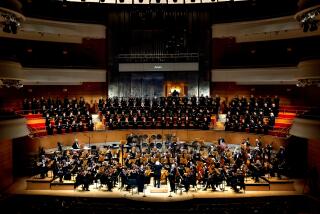Olivier Messaien and the Music of Time <i> by Paul Griffiths (Cornell: $24.95; 243 </i> p<i> p.)</i>
Olivier Messaien has written some of the most essential music of the 20th Century. Paul Griffiths is an intelligent and elegant writer about music and has published distinguished studies of Bella Bartok, Pierre Boulez, John Cage and Peter Maxwell Davies. This book is another very fine one.
Griffiths’ connection to Messaien’s work goes beyond empathy to something like rapt fascination. In this book, an English intellectual of impeccable discipline and taste suggests how to come to terms with, and find terms for, a music of schematic conundrums, garish vulgarities, childlike animism and measureless, precise excesses--the music of a devout, naive, canny, Catholic church organist, a music Griffiths clearly admires and loves.
He spends a lot of space explaining how to deal with the banality and vulgarity, how to cope with insistently religious art in a non-religious age.
I hope these issues are not such a problem for American devotees of Messaien, whose music already had “bins” in predominantly pop and rock record stores in the ‘60s, his particular blatancy and mysticism appealing greatly to the late-hippie yearning for physical immediacy and spiritual certainty.
The academic musical community certainly shook their heads at what Griffiths calls the “saintly naivete” which leads Messaien to use “materials from Glenn Miller and Massenet” to praise Christ, but audiences persistently recognize it for what it most often is, a saving grace.
Griffiths offers fascinating hints of the hidden purposes for the forbidden territory in Messaien’s art: “Like the temple sculptors of India, Messaien celebrates the erotic not as an obverse to the spiritual but as a companion to the shredding of the ego.”
Guiltless and egoless this grandly gesturing music is. Griffiths contends that its greatest achievement is a new way of perceiving and handling time, music’s special province. He celebrates Messaien’s denial of forward-moving time: “His is a conception of music in terms of individual events, distinct from any context.” He demonstrates that Messaien’s borrowings from other cultures, his schematic games, his rendering of birdsong strive not only to widen the embrace of his Catholicism, but also to arrest time’s march, and its corollary development. This places him outside the Western musical tradition where he remains in lonely splendor but for fugitive forays to that region by his students Pierre Boulez and Karlheinz Stockhausen.
Any qualms? In his impulse to portray his protagonist as sprung from the head of Zeus, Griffiths somewhat underplays the continuing force of the bizarre French organ tradition, as in Louis Vierne and Charles Marie Widor, from which Messaien emerged. He is similarly low-keyed about Messaien’s teacher Paul Dukas, whose role was crucial--he who first sent his pupil out to listen to the birds.
Griffiths has no difficulty with the increasing proliferation of aviary species in Messaien’s music, but it is possible to develop a “here they come again” feeling as these selfless singers take over the whole of the universe, visions of Alfred Hitchcock or Widor’s organ belfry.
The author’s mixture of narrative and analysis, some general, some detailed, can be handled by any reader who cares about the music and can read notes. Griffiths will take such a reader far beyond the program-note level previously offered by both the composer and his commentators. Earlier writers on Messaien fell into the trap of overreliance on the composer’s own voluminous pronouncements. Griffiths thinks it out for himself, admitting the composer’s prose for flavor and accent, and achieves a finer account of this enterprise than we have had or may have again.
More to Read
The biggest entertainment stories
Get our big stories about Hollywood, film, television, music, arts, culture and more right in your inbox as soon as they publish.
You may occasionally receive promotional content from the Los Angeles Times.










